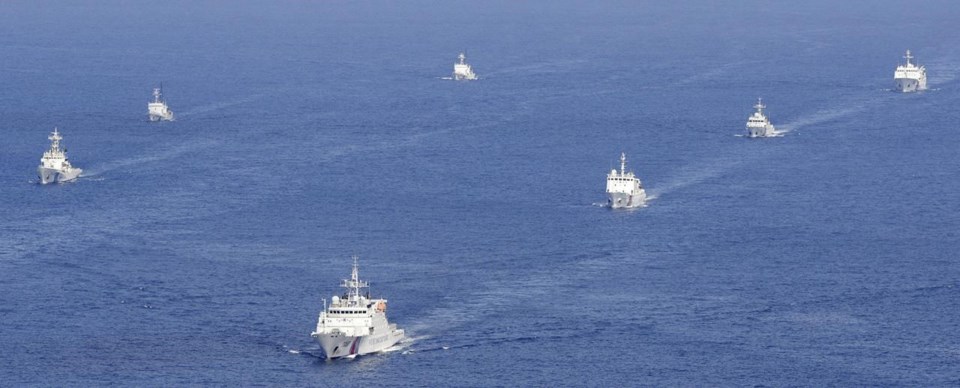TOKYO (AP) — Japan adopted a new five-year ocean policy on Friday that calls for stronger maritime security, including bolstering its coast guard's capability and cooperation with the military as China grows increasingly assertive in regional seas.
The new Basic Plan on Ocean Policy adopted by Prime Minister Fumio Kishida’s Cabinet also says Japan must accelerate the development of autonomous underwater vehicles and remotely operated robots to strengthen its surveillance capability.
It cited a list of threats: Chinese coast guard ships' repeated intrusions into Japanese territorial waters, growing unauthorized maritime activity by "foreign survey boats” inside Japan's exclusive economic zone, increasing joint military exercises by China and Russia, and North Korea's repeated missile launches.
“The situation in the ocean around Japan is increasingly tense," Kishida said at a policy meeting Friday. “It's time for us to unite our wisdom among the industry, academia and government for ocean policy reform — or ocean transformation."
He also noted the need to better use maritime resources to achieve carbon neutrality.
The new ocean policy is in line with Japan's new national security strategy that Kishida's government adopted in December in a major break from the self-defense-only principle that the country has maintained under its postwar pacifist constitution.
The new strategy provides for the strengthening of Japan's military power with a strike capability and double its defense budget within five years. The strategy also calls for closer cooperation between the military and the coast guard in any emergency over Taiwan or other possible conflicts.
Chinese Ambassador to Japan Wu Jianghao urged Japan on Friday to stay away from the Taiwan issue, saying it is China's core national interest and “a red line that should not be crossed.”
He blamed rising tensions around Taiwan on “foreign forces that are colluding with Taiwanese independence forces" and said their ultimate goal is to split self-governed Taiwan, which Beijing claims, from China.
A change in the status quo would cause a "catastrophic outcome,” he said at a news conference. If Japan takes sides with independence forces, it would lead the Japanese people “into the fire,” he said.
The ocean plan also says the capability of Japan's coast guard, which has been on the front line of border disputes, needs to be improved. The coast guard frequently confronts Chinese coast guard vessels approaching Japanese-controlled disputed islands in the East China Sea, North Korean poachers and suspected spy boats, and Russian coast guard vessels near disputed northern islands.
Japan's coast guard is used for civilian policing at sea and not military combat, and the new plans calling for closer cooperation with the Self Defense Force have raised concerns about its role and safety in a possible conflict.
The ocean plan also says Japan needs to be more aggressive about undersea surveys and using undersea resources for energy, calling for greater use of the exclusive economic zone outside of territorial waters to build offshore wind-power generators.
Japan has repeatedly protested over Chinese research ships entering Japanese waters or the exclusive economic zone just outside it for apparent surveys of undersea deposits and other marine resources.
Mari Yamaguchi, The Associated Press




